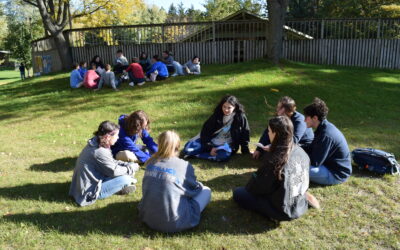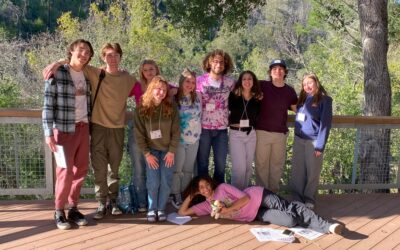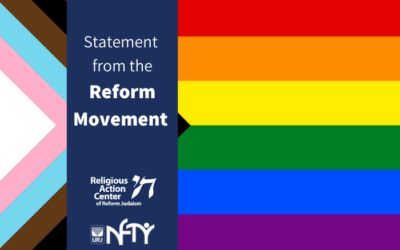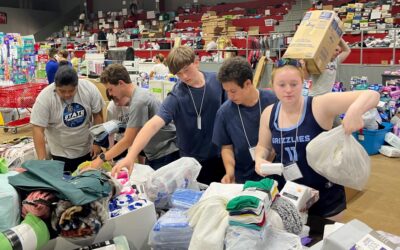By Maya Kendall, NFTY-NAR Membership Vice President and Kol Koleinu fellow
Between Me, You, and Us is a curriculum designed by teens, for teens, to promote understanding of and discussion around important topics relevant to exploring personal identity, communicating desires and boundaries, and building healthy relationships.
Kol Koleinu is a feminist fellowship that was created for Jewish teens across the country to collaborate to create social change. Kol Koleinu is a part of Moving Traditions and partners with NFTY, The Reform Jewish Youth Movement, and USY, United Synagogue Youth. We, the authors, are Kol Koleinu fellows. I began writing Between Me, You, and Us in 2019 with a former fellow Hannah Bases, and Danielle Gruber and I started to work together in 2020 after Hannah completed her fellowship.
At a fall retreat for Kol Koleinu, we discussed how each of us has experienced discrimination. While there were some who had encountered religious or racial intolerance, one common theme among many was the discrimination experienced around issues of sex. “I am catcalled every time I leave the house,” one person said. “He touches me inappropriately and then denies knowing me, ” another painfully admitted. As we all listened to these experiences, we felt compelled to act. As a Kol Koleinu fellow, a major project we complete addresses an issue of social injustice, and we immediately knew this was to be our cause. We wanted to create a sex-ed curriculum that would not only be LGBTQ+ inclusive, but also a curriculum that taught consent — a concept that so many sex-ed classes lack despite the overpowering evidence that it is needed.
We began to work on the very first session of the curriculum which is centered around gender identity and sexuality when the CDC declared that COVID-19 had become a pandemic. Originally, the curriculum was intended to be fully in-person, with the primary facilitator being a high school health teacher, rather than a peer. When we could not safely pursue that option, we adapted the curriculum, not only for remote settings but also to include a peer-to-peer aspect. In addition, an online setting gives the advantage of reaching a broader geographic audience as we can facilitate the curriculum to students across the country. Therefore, this curriculum was written for an online setting, but adaptations for an in-person setting exist throughout so that these significant topics can also continue to be discussed in person for years to come.
One topic that we thought was important to address before diving into communicating desire and boundaries and relationships, was identity and exploration of the self. The students are presented with a Genderbread Person to help explain the concept of gender, sex, and expression. The Genderbread Person is a cutout of a gingerbread cookie and there are different elements of the Genderbread. They include biological sex, gender identity, expression, sexual attraction, and romantic attraction. The students place themselves on a scale of woman-ness and man-ness. There is no beginning to the scale, it is not from one to the other. Instead, there are two scales where each one ended with an arrow and either the word woman-ness/women, or man-ness/men. It is important to us that the students better understand their own identity before they explore themselves with other people.
The second session focuses on personal boundaries and communicating desire. The students begin talking about their own desires with each other through an icebreaker that allows them to tell another student about what gives them pure, uncomplicated joy. Students are also able to explore their boundaries through an activity in which they think about a relationship in their own life. When imagining the relationship, they will define their own soft and hard boundaries. Then, students learn about communication boundaries by brainstorming how to ask for and express consent with their peers.
In the third session, students begin by with a fishbowl activity/conversation about healthy/unhealthy relationships and abuse. As the students watch their peers engage in real conversations about abuse, they evaluate their own beliefs and what they have been previously taught about unhealthy relationships. In addition, instead of lecturing students on what abuse is, we wanted students to realize on their own about how to identify abuse. To accomplish this, students are presented with different examples from the media that portray abuse of all different kinds. Using the Power and Control Wheel, students dissect the clip and discuss what kind of abuse is present, or if there is any abuse present at all. After working closely with their group to analyze the clip, they are brought back together to share findings and opinions on what abuse can and does look like. Before the session closes, we thought it was extremely important to include resources for those who are or know someone who is in an abusive relationship. This is a crucial step to close out the curriculum so that participants have tangible avenues of support beyond this series.
Having a safe space for teenagers to explore their own identity and practice communicating their desires is incredibly important as these spaces are not always readily available within the standard high school experience. We also understand how difficult it is for teenagers to be vulnerable in a space that is full of adult leaders.
The first workshop of the series will be on May 18th from 5:00-6:00 pm EST. The second workshop will be on May 20th from 5-6 pm EST as well and the last workshops will be on May 25th 5-6 pm EST. We cannot wait to see all of you for one, two, or all three sessions!





